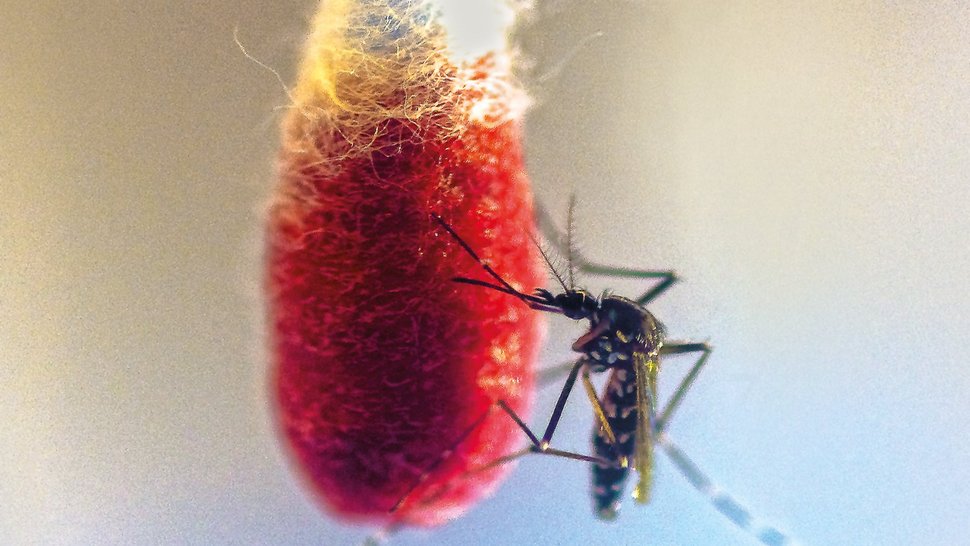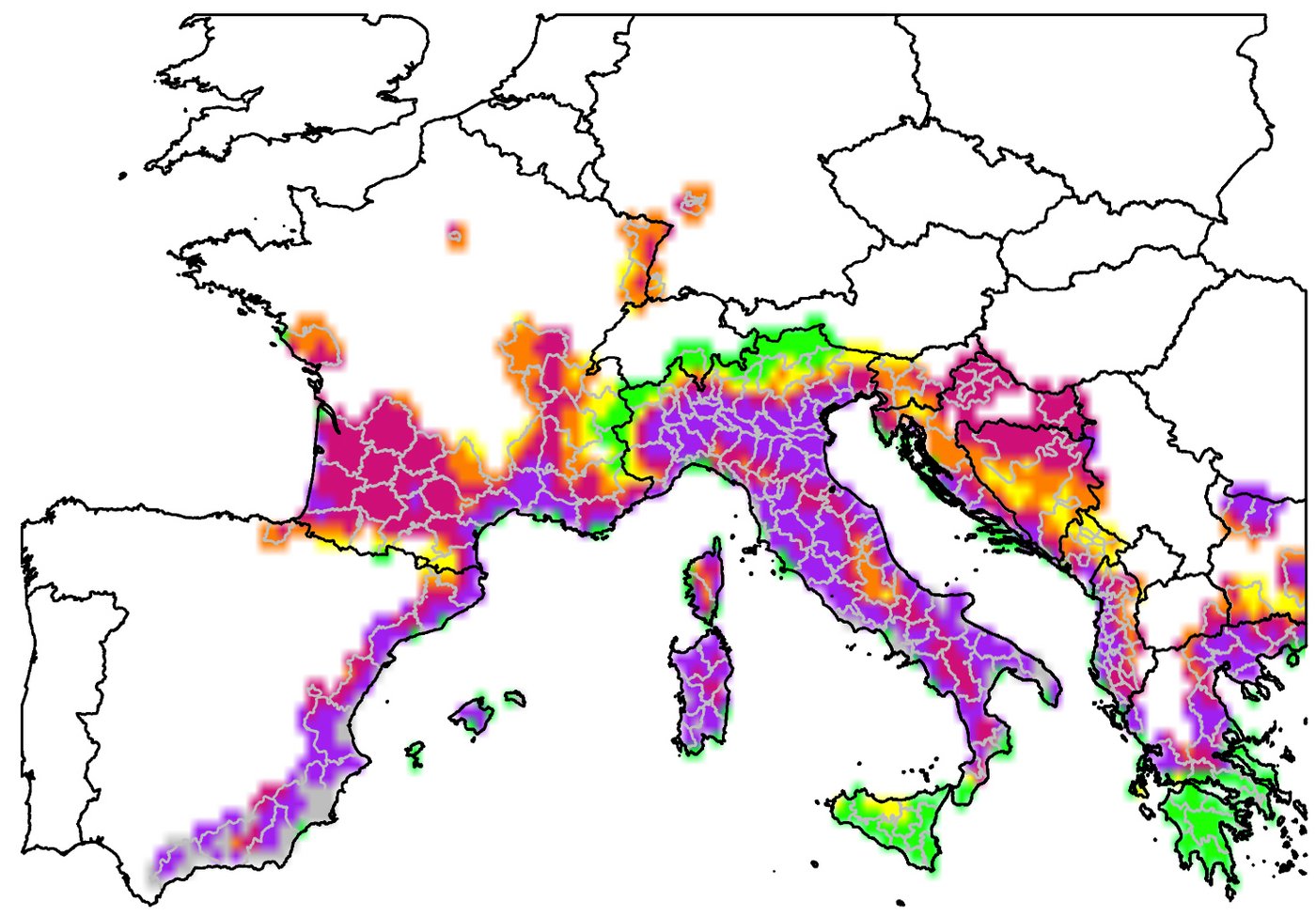BNITM: Less greenhouse gases, more mosquito control!
Klimawandel beschleunigt Ausbreitung exotischer Stechmücken und Krankheitserreger
Wärmere Sommer und veränderte Niederschläge bringen mehr Stechmücken und mehr exotische Infektionskrankheiten mit sich. Das ist stark vereinfacht das Szenario, mit dem infolge des Klimawandels zu rechnen ist. Forschende des Bernhard-Nocht-Instituts für Tropenmedizin (BNITM) fordern deshalb anlässlich des heutigen Welt-Moskito-Tags, den CO2-Ausstoß zu reduzieren und die Stechmückenbekämpfung zu intensivieren.

Climate change promotes outbreaks of mosquito-borne pathogens in two ways. Firstly, exotic mosquito species are spreading further and further north. The Asian tiger mosquito Aedes albopictus, for example, has been native to southern Europe since the 1990s. There, it is particularly responsible for outbreaks of the Chikungunya virus and the Dengue virus. In Germany, Aedes albopictus populations have also become established.
On the other hand, there is the correlation: the higher the midsummer temperatures, the faster many arboviruses multiply in mosquitoes. And the higher the risk that mosquitoes can transmit these viruses to humans and animals.
It is becoming increasingly clear that even native mosquito species can transmit a variety of viruses. The heatwave summer of 2018 saw the first outbreak of West Nile virus in eastern Germany. Since then, there have been annual cases of the disease in birds, horses and humans. "The transmission probability of this virus is directly temperature-dependent: If temperatures rise, so does the risk of infection," says Dr Renke Lühken, head of the Arbovirus Ecology research group at BNITM.
Complex interplay
The interplay between, for example, rising temperatures, rising sea levels, changed precipitation regimes and the risk of transmission of pathogens is very complex. This was recently described in a study by the University of Hawaii in Nature Climate Change.

"This complexity makes societal adaptation very difficult. Therefore, the reduction of greenhouse gas emissions must remain in focus as the most important long-term measure," says Lühken.
In addition, it is now important to establish efficient and effective monitoring and control systems.

Intelligent early warning system
Taking this into consideration, the BNITM is intensifying its contribution to mosquito research, surveillance and control. Particular mention should be made of the European Commission's award-winning project "EarlY WArning System for Mosquito borne diseases" (EYWA) and the BMBF junior research group "Fast real-time decision support for the control method of mosquito-borne viruses".
Both projects collect weather data, results of mosquito counts, information on virus detection e.g. in Europe and Germany and evaluate them with the help of mathematical models. This way, local outbreaks of mosquito-borne diseases can be predicted in the short term. This is important because mosquitoes can be controlled well in clearly defined areas and outbreaks can be brought under control quickly. This early warning system is now being established by BNITM in countries of the Global South such as Thailand and Côte d'Ivoire.
"Mapping, modelling and controlling mosquitoes is particularly important in tropical countries because mosquitoes transmit many serious infectious diseases there," says the head of BNITM, Prof. Jürgen May. "This is where most of these infections originate that are now spreading to us."


Targeting mosquitoes
To keep mosquitoes in check, however, trained personnel are needed, says the head of the Department of Arbovirology and Entomology at the BNITM, Prof. Jonas Schmidt-Chanasit:
"Mosquito control urgently needs to be professionalised throughout Germany. There must be targeted and sustainable control of mosquitoes without harming other insects in the process."
There are role models, says Schmidt-Chanasit. In Greece, for example, where the management of the EYWA consortium is based. There, EYWA provides such precise results of outbreak areas that risk zones can now be identified and mosquitoes can be combated in a targeted manner. Or the Kommunale Aktionsgemeinschaft zur Bekämpfung der Schnakenplage e.V. (KABS), an association of municipalities on the Upper Rhine. They joined forces decades ago and work, among other things, with mosquito-specific insecticides that are applied in breeding waters. KABS is also part of the international early warning system.
World Mosquito Day
On 20 August 1897, the British physician of tropical medicine Sir Ronald Ross proved that the malaria parasite is transmitted by female mosquitoes of the genus Anopheles. In doing so, he not only revolutionised malaria research and control. His findings are still fundamental today for understanding epidemics that originate from insects. In 1902, Ross received the Nobel Prize for Medicine or Physiology.
Service
How can I protect myself from mosquitoes?
Remove possible breeding places for mosquitoes on the balcony and in the garden: buckets, unused flower pots, open watering cans, old tyres or similar. Cover rain barrels. Put mosquito nets on your windows or over your beds. Use mosquito sprays whose effectiveness has been scientifically tested, e.g. by the Bernhard Nocht Institute for Tropical Medicine (blue seal of approval). These so-called guarantee marks are given to repellents if in laboratory tests they keep away different mosquito species such as Culex, Aedes and Anopheles to a high degree.
More information
regarding EarlY WArning System for Mosquito borne diseases (EYWA):
https://www.bnitm.de/eic-horizon-prize-for-eywa
regarding the Department of Arbovirology and Entomology:
on mosquitoes in Germany:
https://www.bnitm.de/aktuelles/fragen-und-antworten/faq-zu-stechmuecken-in-deutschland
You have found a dead blackbird or an unusual mosquito? Send it to us! You will be helping our Citizen Science research:
https://www.bnitm.de/aktuelles/fragen-und-antworten/faq-zum-usutu-virus
About the Bernhard Nocht Institute for Tropical Medicine
The Bernhard Nocht Institute for Tropical Medicine (BNITM) is Germany's largest institution for research, care and teaching in the field of tropical and emerging infectious diseases and a member of the Leibniz Association. Current research focuses on malaria, worm infections and other parasitoses as well as diseases caused by arboviruses and haemorrhagic fever viruses. For handling highly pathogenic viruses and infected insects, the institute has laboratories of the highest biological safety level (BSL4) and a safety insectarium (BSL3). BNITM includes the national reference centre for the detection of all tropical infectious agents and the WHO collaborating centre for arboviruses and haemorrhagic fever viruses. Together with the Ghanaian Ministry of Health and the University of Kumasi, it operates a modern research and training centre in the West African rainforest, which is also available to external working groups. In addition, the Institute maintains numerous other cooperations in other African countries such as Gabon, Nigeria, Tanzania and Madagascar.
Contact person
Prof. Dr Jonas Schmidt-Chanasit
Head of Arbovirology/ Entomology Department
Phone : +49 171 212 7900, +49 40 285380 271
Email : schmidt-chanasit@bnitm.de
Dr Renke Lühken
Group Leader Arbovirology Ecology
Phone : +49 40 285380-862
Email : luehken@bnitm.de
Dr Eleonora Schoenherr
Public Relations
Phone : +49 40 285380-269
Email : presse@bnitm.de
Julia Rauner
Public Relations
Phone : +49 40 285380-264
Email : presse@bnitm.de







